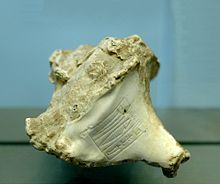
Back Šar kiššatim German Rey del Universo Spanish پادشاه کائنات Persian Raja Semesta Alam ID Re della totalità Italian 世界の王 Japanese 우주의 왕 Korean Król wszechświata Polish د نړۍ پاچا Pashto/Pushto Rei do Universo Portuguese


King of the Universe (Sumerian: lugal ki-sár-ra[1] or lugal kiš-ki,[2] Akkadian: šarru kiššat māti,[1] šar-kiššati[1] or šar kiššatim[3]), also interpreted as King of Everything, King of the Totality, King of All[2] or King of the World,[4] was a title of great prestige claiming domination of the universe used by powerful monarchs in ancient Mesopotamia. The title is sometimes applied to God in the Abrahamic tradition.
The etymology of the title derives from the ancient Sumerian city of Kish (Sumerian: kiš,[5] Akkadian: kiššatu[6]), the original meaning being King of Kish. Although the equation of šar kiššatim as literally meaning "King of the Universe" was made during the Akkadian period, the title of "King of Kish" is older and was already seen as particularly prestigious, as the city of Kish was seen as having primacy over all other Mesopotamian cities. In Sumerian legend, Kish was the location where the kingship was lowered to from heaven after the legendary Flood.
The first ruler to use the title of King of the Universe was the Akkadian Sargon of Akkad (reigned c. 2334–2284 BC) and it was used in a succession of later empires claiming symbolical descent from Sargon's Akkadian Empire. The title saw its final usage under the Seleucids, Antiochus I (reigned 281–261 BC) being the last known ruler to be referred to as "King of the Universe".
It is possible, at least among Assyrian rulers, that the title of King of the Universe was not inherited through normal means. As the title is not attested for all Neo-Assyrian kings and for some only attested several years into their reign it might have had to be earned by each king individually, possibly through completing seven successful military campaigns. The similar title of šar kibrāt erbetti ("King of the Four Corners of the World") may have required successful military campaigns in all four points of the compass. Some scholars believe that the titles of King of the Universe and King of the Four Corners of the World, with near identical meanings, differed in that King of the Universe referred to rule over the cosmological realm whereas King of the Four Corners of the World referred to dominion over the terrestrial. The verbatim translation of "King of the Universe" as a name exists in many languages; for example, in Hindi the translation would be Nikhil Shah and in Urdu, Shah Jahan.[citation needed]
- ^ a b c Levin 2002, p. 362.
- ^ a b Steinkeller 2013, p. 146.
- ^ Roaf & Zgoll 2001, p. 284.
- ^ Stevens 2014, p. 73.
- ^ The Electronic Text Corpus of Sumerian Literature.
- ^ Electronic Pennsylvania Sumerian Dictionary.